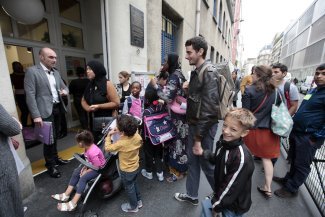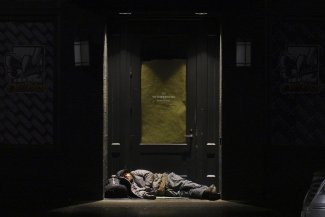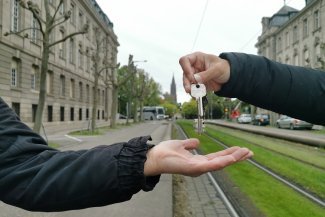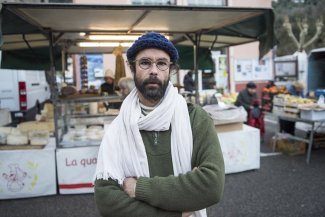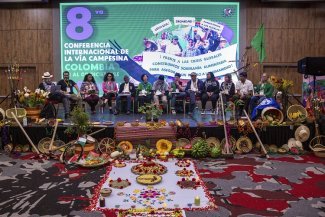The living conditions experienced by homeless children – lack of hygiene, difficulty accessing health services and maintaining a balanced diet, instability due to regularly changing living spaces – take a toll on their physical and mental health.
“We’d like a house to raise our children in,” says Maria [whose name has been changed] in a quiet voice. When the weather in Strasbourg got cold in late December, this mother of four and her family were moved indoors to a sports hall for temporary shelter. The six families being temporarily housed there sleep on camp beds and have no privacy. In the evenings, the gym echoes with the din of children shouting. “These are no conditions for children to live in, but at least they have a roof over their heads,” says Delphine Bernard, a childminder and member of the collective Pas d’enfant à la rue (No Street Children) 67, created in November 2021.
When she arrives at the improvised shelter on this cold January morning, pencils and papers in hand, she barely makes it through the door before the children run into her arms. “When the gym closes, will my mum be on the street?” asks one of Maria’s daughters. Bernard, 42, who is also a member of the Fédération des Conseils de Parents d’Élèves (the Federation of Parents’ Councils, or FCPE), is distraught. “I’m a mother. When I see these children who have nothing going to sleep in the street its unbearable,” she says.
Several of the men housed in the gymnasium, all of whom have migrant backgrounds, stand in front of the building. One after another, they express their anger: “No one asks us how we are. We have documents but no one looks at them, no one listens to our story,” says one man, originally from the Balkans. “I have three children here, a seven-year-old, a three-year-old and a nine-month-old. How am I supposed to bathe my infant here?” he asks, while another pulls up the Human Rights Convention on his phone. Before being housed in the Branly gymnasium, the men tell us, they slept at the railway station with their young children.
In 2019, the Abbé Pierre Foundation, which fights against bad housing and exclusion, estimated the number of homeless children in France at 30,000. While no census has been carried out since then due to the pandemic, local charities or associations that help people in need have noted an increase in the number of homeless children throughout the country, particularly due to the arrival of new migrants, increased precariousness, a shortage of social housing and a lack of sufficient emergency accommodation.
In his report presented to the United Nations Committee on the Rights of the Child in July 2020, the then Defender of Rights Jacques Toubon (an independent authority in France tasked with protecting fundamental rights and freedoms) highlighted the failures of the French government in terms of emergency accommodation, criticising in particular a 2017 circular that allows immigration services to carry out immigration status checks in overcrowded emergency shelters.
The border police in Strasbourg have carried out two such checks at the Branly gymnasium. Some families without a residence permit were taken to the Centre de Préparation au Retour (Return Preparation Centre, or CPAR), more than 30 kilometres from the city, essentially a waiting room for deportation. “Do you expect the associations to stand by quietly while these unhoused people are sent away? It’s a trap, they’re essentially being rounded up,” says Bernard indignantly.
Organising to help people in need
Pas d’enfants à la rue was created to call attention to the urgent plight of homeless children. In June 2021, Yaël Benhayon, 42, a primary school teacher, discovered that one of her nine-year-old pupils and his family were living on the street. Benhayon organised a solidarity fund which enabled the family to be housed through the end of September.
A few weeks later, Benhayon learned that they were back on the street. “They were living in tents in November, it was cold. That’s when it really got to me. I was worried sick and had nowhere to turn,” she says. A meeting was organised with other teachers, parents and associations: “A lot of people were motivated and the collective came together on its own,” she explains.
As Benhayon explains, the group’s purpose was never to take the place of the state or the competent authorities, but rather to ensure that “people aren’t left alone to deal with the distress of others”. Cecilia Quintiliani confirms how vital such support can be. A school nurse, she has seen some pupils come to school with a fever after spending the night in a stairwell or a car.
Members of the collective are motivated by compassion. “All of us have experiences that make it hard for us to turn away,” says Quintiliani, a single mother with an immigrant background.
“My Italian parents lived in makeshift housing before they were able to build a life here. Fortunately, they had help and support. I see this as a continuation of that. If everyone participates and gets involved, we won’t have these situations anymore,” she says.
Bernard has little sympathy for those who remain insensitive to children living under such conditions: “I can’t stand to see people being so indifferent to the misery of others, I need to do something to help.”
With French public services underfunded and slow to respond, citizens are organising on a voluntary basis to fill in the gaps. “It’s not our job to provide shelter but we try to act as quickly as possible in the best interests of the children. For us, that’s the most important thing,” explains Bernard. The members of the collective have written an open letter to local authorities calling for more emergency housing and for identifying and requisitioning empty housing for permanent solutions. “The town hall and the prefecture simply point the blame at one another while we are left to fend for ourselves. The state truly doesn’t want to house these families, which flies in the face of child protection,” says Benhayon.
The families in the Branly gymnasium were moved again in early February: some were taken to the CPAR, others were accommodated in hotels. Faced with such impermanent solutions, many families return to living on the streets.
Violations of the rights of the child
Anxiety, sleep disorders, language difficulties, fatigue, even depression: the living conditions experienced by homeless children – lack of hygiene, difficulty accessing health services and maintaining a balanced diet, instability due to regularly changing living spaces – take a toll on their physical and mental health.
Access to education is also not always available, which hinders the child’s development and integration. Even when they are in school, many are unable to fully engage in learning. Children who are isolated and on the street are also at risk of becoming part of human trafficking networks.
Yet France was the second European country to sign the International Convention on the Rights of the Child, adopted by the United Nations in 1989. The Convention provides children with the right to an adequate standard of living, healthcare, food and education, as well as access to justice and social security.
In its report on the treatment of child and adult migrants in northern France, published in October 2021, the NGO Human Rights Watch also notes a deterioration in the living conditions of migrants, including repeated evictions, police harassment, policies restricting the distribution of food and water, and impediments to humanitarian aid.
On 28 February 2019, France was condemned by the European Court of Human Rights (ECHR) in the case of Khan v. France for violating Article 3 of the European Convention on Human Rights which states that “no one shall be subjected to torture or to inhuman or degrading treatment or punishment”. The Court found that France had failed to protect Jamil Khan, aged 11 at the time, an unaccompanied Afghan minor who lived for several months in Calais in unsuitable conditions.
While waiting for long-term solutions, Pas d’enfant à la rue has begun to take a census of all the children who aren’t in school. “Our goal is to make sure all of them go to school. This way they spend the day inside where its warm, they socialise with other children and they learn the language,” says Bernard. The collective also urges the authorities to ensure that all children have access to the canteen “to make sure they eat at least one warm, balanced meal a day”.
Faced with an untenable situation and the failure of public services to respond, the collective Jamais sans toit (Never Homeless), created in 2014 in Lyon, goes one step further. Its members occupy schools between school hours to shelter families there.This is an illegal practice, but one that the municipality tolerates. “We take into account the urgency of the situations without interfering with classes,” explains Raphaël Vulliez, a teacher and member of the collective.
Jamais sans toit represents nearly 80 schools in the Lyon area. “It usually takes around 40 people to occupy a school,” explains Vulliez. The collective occupies between six and 20 schools on average each year, especially in winter. They have also counted between 250 and 350 children living on the street, though they suspect the actual number to be much higher. This year, the Lyon-based collective provided temporary housing for 53 children.
Pas d’enfant à la rue doesn’t rule out taking similar action in Strasbourg. “One of my pupils was homeless and the school principal asked that the school be used as accommodation. One of my colleagues and I threatened to occupy the school. They wouldn’t let us. At 4pm, they provided accommodation,” Bernard recalls.
Jamais sans toit claims that such pressure allows them to obtain results: the families they support are generally the first to be housed. “We’re just asking for the laws to be applied, nothing more and nothing less : the right to emergency accommodation enshrined in law and the right to schooling,” says Vulliez.




